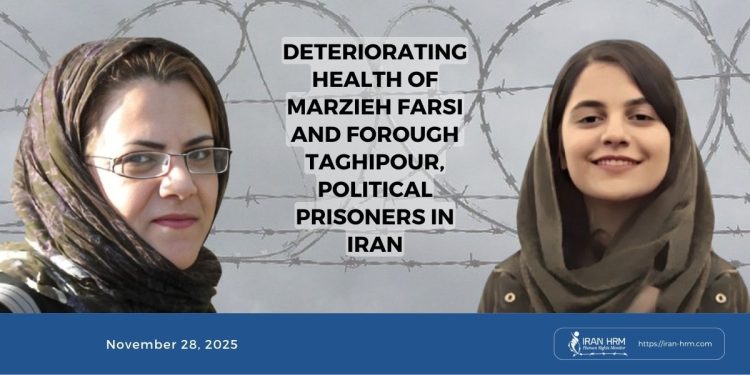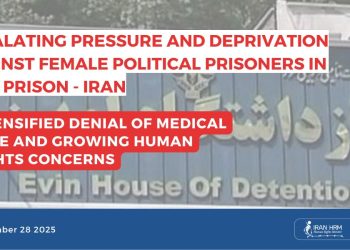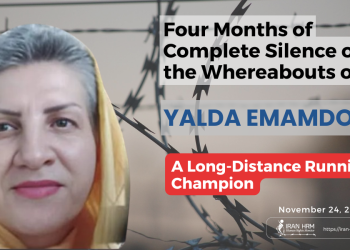The physical condition of two political prisoners, Marzieh Farsi and Forough Taghipour, both serving five-year sentences in the women’s ward of Evin Prison, has become increasingly alarming in recent weeks. Numerous reports from Ward 6—an overcrowded section long criticized for its high humidity, lack of facilities, and unsanitary environment—indicate escalating health problems, deprivation of medical care, and continuous security pressure on both prisoners. Their families and human rights defenders have repeatedly raised concerns about their deteriorating health, yet judicial and security authorities, as well as the Prison Organization, have failed to provide any response.
Despite both women having a history of detention, prolonged interrogations, and lengthy sentences, the ongoing denial of access to essential medical services and necessary medication has intensified fears of irreversible physical and psychological harm. Their cases illustrate a broader, systematic pattern of medical deprivation and punitive pressure against political prisoners under the rule of Velayat-e Faqih.
Factual Account
Marzieh Farsi, a 58-year-old mother of several children, has long struggled with cancer and heart disease. Her transfer from Qarchak Prison to Evin did nothing to improve her condition; instead, it exacerbated her health problems. Persistent headaches, severe dizziness, chronic fatigue, and worsening cancer symptoms continue to afflict her, while prison authorities refuse to allow vital medication into the facility. Her physician previously prescribed essential medication to control cancer cell growth and stabilize her cardiac condition, yet prison officials have blocked these medications under administrative and security pretexts. The high humidity of the ward, lack of proper ventilation, psychological pressure, and persistent uncertainty have all intensified her symptoms.
Forough Taghipour faces similar concerns. Originally arrested in March 2020 and released in February 2023 after serving several years, she was re-arrested on 21 August 2023 during the crackdown marking the anniversary of the nationwide protests. Despite her physical ailments, general weakness, and urgent need for medical examinations, she is held in an environment lacking even basic necessities.
Ward 6 of Evin suffers from a chronic shortage of hygiene supplies, lack of sufficient hot water, overcrowding, and long delays in medical examinations. Humiliating behavior by prison guards, repeated threats, and psychological pressure have further exhausted her physically and mentally. One clear example of medical deprivation occurred when her hospital transfer was blocked because she refused to wear shackles and handcuffs—a coercive practice repeatedly imposed on political prisoners. She was kept waiting for hours, subjected to harassment, and ultimately returned to the ward without treatment.
Case Background
The arrests of Marzieh Farsi and Forough Taghipour on 21 August 2023 took place as part of the large-scale detentions marking the first anniversary of the nationwide protests. After their arrest, they were transferred to Ward 209 of Evin Prison and subjected to lengthy interrogations. Judge Iman Afshari of the Revolutionary Court sentenced both women to 15 years in prison on charges of baghi (“armed rebellion”) and “connection with the People’s Mojahedin Organization of Iran (PMOI).” Due to lack of credible evidence and contradictions in the case file, the sentence was reduced to five years on appeal.
Marzieh Farsi had previously been arrested on 18 February 2020 in Rey and sentenced to five years in prison after months of interrogation and psychological pressure. She was released in March 2023, but less than a year later, she was re-arrested amid a new wave of suppression. Her health has remained unstable throughout these years, and medical specialists have repeatedly emphasized the need for continuous treatment and monitoring.
Forough Taghipour, born in 1994 and holding a bachelor’s degree in accounting, was arrested along with her mother on 24 February 2020 and transferred to Ward 209. Judge Amouzad at Branch 28 of the Revolutionary Court prosecuted her on charges of “assembly and collusion” and “membership in the PMOI,” and even threatened her with a moharebeh (“waging war against God”) charge. After serving a five-year sentence, she was released in February 2023. Her re-arrest in August 2023 reopened a new cycle of judicial and security pressure against her.
Medical Deprivation as a Form of White Torture
The approach of security agencies and prison authorities toward these two women demonstrates that medical deprivation is not caused by logistical shortages but is instead a deliberate mechanism of coercion. In the case of Marzieh Farsi, blocking essential cancer medication and denying access to specialist care pose a direct and serious threat to her life.
For Forough Taghipour, canceled hospital transfers, forced shackling, humiliating treatment by guards, and repeated returns to the ward without medical attention are all clear examples of white torture—a method of punishment based on psychological pressure, deprivation, uncertainty, and gradual physical deterioration. This practice, implemented systematically, seeks to break the prisoner’s resilience through a prolonged strategy of erosion rather than overt violence.
Degrading Conditions in Evin Women’s Ward
Ward 6 of Evin Women’s Prison has for years been regarded as one of the most exhausting environments within the facility. High humidity, inadequate ventilation, lack of sanitary supplies, insufficient hot water, overcrowding, and restricted access to physicians and medication have turned the ward into a hazardous environment for prisoners. These conditions directly harm the physical well-being of political prisoners and, in cases such as those of Marzieh Farsi and Forough Taghipour, significantly worsen serious medical conditions.
Human Rights Analysis and Legal Violations
The medical deprivation imposed on Marzieh Farsi and Forough Taghipour constitutes a blatant violation of international human rights standards. Under Article 3 of the Universal Declaration of Human Rights (UDHR), every individual has the right to life, liberty, and personal security. Ignoring cancer, cardiac issues, severe headaches, and gastrointestinal complications amounts to a direct threat to their safety.
Furthermore, Article 5 of the UDHR and Article 7 of the International Covenant on Civil and Political Rights (ICCPR) prohibit torture and cruel, inhuman, or degrading treatment. Denial of medical care meets the definition of such treatment.
The Nelson Mandela Rules (Rules 22, 24, and 25) require adequate medical services, timely hospital transfers, and safe, sanitary conditions. The treatment of these two prisoners violates these rules openly and systematically.
Conclusion and Immediate Risk
With escalating medical problems, lack of treatment, continuous security pressure, and complete judicial indifference, the condition of Marzieh Farsi and Forough Taghipour is more concerning than ever. If this pattern continues, it may lead to irreversible and potentially life-threatening consequences. Their families and human rights defenders call for urgent medical transfer, immediate treatment, and an end to unlawful and inhumane practices in Evin’s women’s ward. Their cases reflect a broader pattern of medical deprivation used as a punitive tool against political prisoners in Iran, placing direct responsibility on security and judicial authorities.







